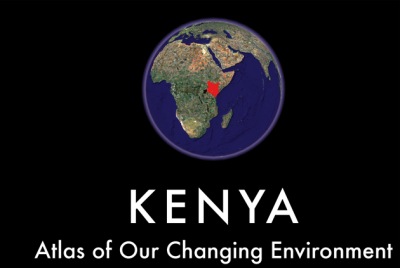Kenyan bloggers are talking about UNEP. First, regarding news of an Atlas that shows Kenya's changing environment, and secondly, the hypocrisy of driving into a UNEP meeting in a gas guzzler. Global Voices environment has covered the reaction of bloggers to UN's use of SUV's, please see this post on ‘Yellow Humvees and the UN procurement scandal’ from November of 2008.
The United Nations Environment Program, which is headquartered in Nairobi, Kenya launched the atlas earlier this week. A description from the UNEP site states
Kenya: Atlas of Our Changing Environment, produced at the request of the Kenya Government, provides visual and compelling evidence of the rapid changes taking place in the country's critical ecosystems due to pressures from human activities. The side-by-side display of historical and current remote-sensing images highlight forest degradation, wetland drainage, and shrinking lakes to the impacts of refugees on fragile ecosystems and signs of coastal degradation. The Atlas provides a good evidence base for strategic intervention by the government and communities.
Phil of Kenya Environment news blog points out the key conclusions from the 168-page Atlas, summarizes the key findings, and relates it to the UN's Millenium Development Goals, and Kenya's own Vision 2030. He writes…
One key finding of the Atlas is that achieving environmental sustainability is fundamental to achieving all the MDGs. Environmental resources and conditions have a significant impact on many aspects of poverty and development.
“One of the most powerful ways to help achieve the first MDG – eradicate extreme poverty and hunger – is to ensure that environmental quality and quantity is maintained in the long term,” the authors say.
For instance, poor people often depend on natural resources and ecosystems for income; time spent collecting water and fuelwood by children can reduce the time at school; and environment-related diseases such as diarrhoea, acute respiratory infection, leukemia and childhood cancer are primary causes of child mortality.
“Vision 2030, with its ambitious development blueprint, is a key opportunity for the Kenyan Government to address environmental challenges as a key element underpinning the country’s sustainability and development,” concludes the Atlas.
The Rafiki Kenya blog takes a closer look and asks ‘New Kenyan Atlas a waste of resources?’, amongst other questions about the report's accessibility to the regular Kenyan. The blogger admits that the report looks nice and is very well done with some interesting information, but…
… if you dig into the atlas a bit deeper, there is really nothing new in there. Nothing we didn't know already, I would say. Even the video that comes with it is a bit disappointing: mostly things you can also see through Google Earth, and with a non-Kenyan voice-over.
Should the production of this atlas really have been such a priority for UNEP? Does it make sense to do more tests on a sick patient when you already know which disease s/he is suffering from? Instead of spending more money on doing more tests and producing additional test reports, you would start treating the patient, right? So I think that is what UNEP should have done now: start treating the sick patient. Start treating our threatened environment by promoting and facilitating practical interventions for example. Kenyans were not really waiting for yet another nice report to gather dust on the shelves.
Also, the report is not very accessible to the average Kenyan. OK, you can download and/or buy the report here. But which Kenyan is really able to download a file of 63 MB? Or which Kenyan can afford US$80 for the hardcopy? And this is without shipping charges from the UK by the way. Why a report which is about Kenya and which has been produced by an organization (UNEP) based in Kenya needs to shipped from the UK is still a mystery to me. Is this another case of hypocrisy at UNEP? The use of SUVs by UN staff in Nairobi has been rankling some bloggers for some time now.
This brings us to the next topic causing much rancor. The SUVs that the President and other dignitaries drove in to attend the high level meeting at the UNEP headquarters in Gigiri, at which the Atlas mentioned above was unveiled amidst talks on a ‘new green economy’. Dipesh of Sukuma Kenya blog writes…
“Low Carbon Economy”
What sort of vehicles do you think these 140 important people rocked up to the meeting in? Perhaps one of these?
No, doubt our Very Important People's Government of Kenyan wanted to make sure they can live up to the very high standards set by the United Nations. And of course we all know that there is no shortage of fancy cars donated by Kenyan citizens the GoK. Between January 2003 and September 2004, President Mwai Kibaki's government spent at least Kshs 878 million in the purchase of luxury cars that were largely for the personal use of senior government officials such as ministers, assistant ministers and permanent secretaries.
Dipesh recounts the experience had with UNEP officials when he tried to make them aware of how their messages urging others to reduce their carbon footprint while UNEP cars are largely SUVs with high CO2 emmissions. He also ties the misallocation of resources and corruption to the current food crisis in Kenya.
A comment left on the post gives a suggestion, with which we end this post:
Perhaps such meetings should have a shuttle service for all who attend, that way you reduce the number of individual vehicles that need to be used for transport. I wonder how that would go down. If GK and UNEP want to preach about creating a greener Kenya the logical 1st step would be to take the initiative and set an example? But i guess things don't work logically here in Kenya. I still don't understand why the government thinks it is above the civil society, my understanding of governments was that they were around to serve the people not the other way around.








